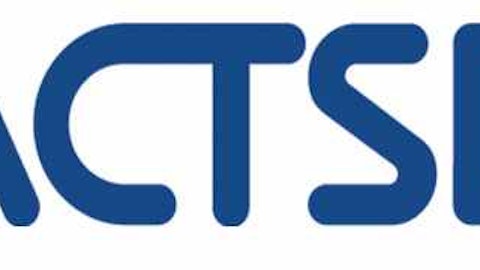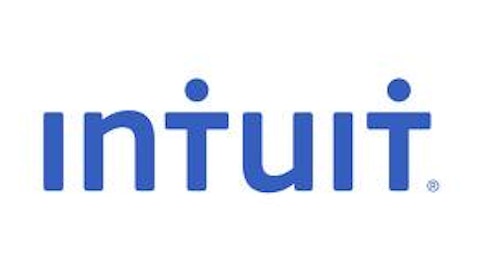Intuit Inc. (NASDAQ:INTU) faces an uphill task as it confronts the challenge of migration to mobile. Yet again, the company wants to make mobile tools for filing taxes a part of its future. Intuit is the market leader in personal finance software and associated accounting packages. The company’s rivals, H&R Block, Inc. (NYSE:HRB) and Paychex, Inc. (NASDAQ:PAYX) continue to languish behind the Mountain View, CA-based application software company.
Intuit Inc. (NASDAQ:INTU) wants to up its game in iPad and iPhone tools for filing taxes. The transition to mobile from desktop platforms by users has become a destructive aspect in the world as we know it, and especially, for companies that relied on personal computers as a part of their business. It is either you adapt, or you become obsolete and you lag behind. Intuit is trying to avoid this trap by making sure that there are tools for those who rely so much on mobile devices.
Intuit beats estimates despite a tough tax season
In its most recent quarter results, Intuit Inc. (NASDAQ:INTU) beat analyst estimates, albeit marginally, following a tough tax season. The company reported $2.18 billion in revenue, up 13% year-over-year, beating analyst estimates of $2.17 billion. According to Bloomberg’s report, the company reported $2.97 in earnings per share compared to the consensus estimate of $2.93. The margins were quite thin, and arguably insignificant, the more reason why several pundits have likened the performance to a flattish showing.
However, Intuit Inc. (NASDAQ:INTU)’s EPS was down 42.5% from last year. This came despite the company holding one of the best gross margins of 83%, well above industry average of 73%. The company’s net profit margin stands at a paltry 7.3%. Its operating margin is, however, impressive at 29%, compared to the industry’s 22%. The company’s long-term debt obligations are no threat, since its debt to equity ratio stands at 0.18. Nonetheless, the company seems to be paying too much interest with a quick ratio of 0.86, well below the recommended 2:1 ratio.
Intuit Inc. (NASDAQ:INTU) registered significant growth rates in its various business units. The small business group was up 17%, which includes the Financial Management Solutions sub-unit. This sub-unit saw significant growth rates, especially QuickBooks online subscriptions, which were up 26% from last year, while Demandforce, acquired in 2012, contributed 65% of this growth.
The integration seems to be working quite perfectly. Elsewhere, Employment Management Solutions reported 11% increase in revenue while Payment Solutions reported an increase of 13%. Revenue from the Accounting Professionals unit increased 4% while the Financial Services unit reported pre-adjusted 9% increase, year-over-year.
Valuation
Intuit Inc. (NASDAQ:INTU) currently trades at 20.34 times trailing earnings, well below the industry average of 25.78. Its close rival, H&R Block, Inc. (NYSE:HRB), trades at 23.30 times, while Paychex, Inc. (NASDAQ:PAYX) is currently pegged at 24.55x. Intuit projects FY13 revenue of approximately $4.5 billion and diluted non-GAAP EPS of about $3.33. Going by the current PE of 20.34x, Intuit could still trade at 22x PE and maintain its status as the cheapest stock among its rivals. This would mean a price upwards of $73 per share, which is a 24% upside from the current market price of $59.
Can Paychex and Block Keep Up?
Fundamentally, Paychex, Inc. (NASDAQ:PAYX) is definitely the company with a realistic chance of ousting Intuit Inc. (NASDAQ:INTU) from the top. However, the company is not a direct competitor to Intuit since only a part of its staffing and outsourcing services compete directly with the California-based company. The New York-based Paychex has no debt on its balance sheet, and has better operating and profitability margins. The company’s operating margin stands at 38.78% compared to Intuit’s 28.62%. Its profit margin is equally superior at 24.81% versus Intuit’s 19.76%. However, Intuit’s trailing 12-month revenue is far superior at $4.4 billion compared to Paychex’s $2.29 billion.
Block, on the other hand, trails the trio with a profit margin of 13.64% while its operating margin stands at 22.09%. The company also faces a possible exodus of its customers following the glitch in its tax payment program in March. According to reports, 600,000 tax returns could easily be affected by the glitch, thus posing a major threat to the loyalty of its customers. According to the company’s most recent quarterly results, revenue fell 30.5%. The company is highly geared with a debt of $1.33 billion on its balance sheet, translating into a debt to equity ratio of 209.75.
The bottom line
Intuit Inc. (NASDAQ:INTU) offers the bets value for money to investors compared to its rivals. While Paychex, Inc. (NASDAQ:PAYX)has better margins, it appears as though these have already been factored in its pricing. In terms of PE ratios, Intuit is the cheapest stock among the three, while Paychex trades just below the industry average. Block, on the other hands, is all hands down, and with its problems having been magnified by the glitch, Intuit stands an opportunity to increase its subscriber base.
In a recent article published on Fool.com, Intuit demonstrated some strong fundamentals against Paychex with a five-year average sales growth rate of 9.3% compared to Paychex, Inc. (NASDAQ:PAYX)’s 3.4%. This is a marvelous buying opportunity for Intuit just before it announces its full year results.
Nicholas Kitonyi has no position in any stocks mentioned. The Motley Fool recommends Intuit and Paychex. The Motley Fool owns shares of Intuit.
The article Is Now the Time to Bet on This Personal Finance Software Company? originally appeared on Fool.com.
Copyright © 1995 – 2013 The Motley Fool, LLC. All rights reserved. The Motley Fool has a disclosure policy.





